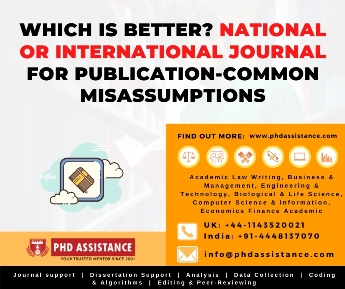Which is better? National or International Journal for publication- common misassumptions
INRODUCTION

Scholarly journals are one of the most important means of communication among scientists. The number of citations to published papers, which is an indicator of a journal’s impact on the science world, is often used to measure its quality. Thomson Scientific’s (formerly the Institute for Scientific Information) impact factor (IF) has become a benchmark for assessing the content of journals and the scientists who publish in them. This is not necessarily applicable to applied sciences, as opposed to pure research disciplines [1]. This is especially true of journals written for a strictly national market, especially if they are published in languages other than English; these journals also have a long publication history and a strong professional and societal position, but they fail to sustain manuscript inflows or to withstand market challenges. This report discusses the common misassumptions and doubts about the international and national journals.

- i) The common misassumptions and doubts among researchers
And if it matters less, whether it is National or International, many persons with sound common sense and a track record of publishing make the distinction necessary on an instance. Almost all applications for academic positions or promotions at various universities and research institutes around the country require the applicant to separate information about his or her research publications in ‘Indian’ or ‘National’ journals from information about his or her research publications.
The majority of scholars would like to be known for publishing in international journals regularly. This may not be the criterion to challenge their patriotism in the field of science but rather a matter of national pride. Even if some National journals may contain high-quality studies that can be accepted in several International journals, publishing in an International journal tends to be considered more prestigious than publishing in a National journal. What do the words “international” and “national” really mean? What if a native researcher publishes his or her work in a local journal with a higher Impact Factor than most international journals in that field? [2]
When a journal publishes an article from another region, it may continue to be referred to as an “international paper.” However, this should apply to the nature of the published report rather than its quality. As a result, the journals can be categorised as follows:
(a) An institutional journal belonged to and was started by a person or an organisation.
(b) A national journal that is affiliated with or started by a national organisation or society.
(c) An international journal is published by or belongs to a publisher/society that works on a national/international basis.
ISSN stands for International Standard Serial Number and is abbreviated to ISSN. The ISSN is a globally recognised identifier for serial publications such as journals, books, newsletters, and newspapers. Many people contend that any journal with an ISSN assigned from a specific country is considered national. However, ISSN assigning agencies have been developed in several countries for convenience, although their existence has little bearing on whether a publication is classified as national or regional.
How will an international and a national publication be distinguished?
It’s risky to mark a publication as “global” or “universal.” There are several factors to take into account!
Many people believe it is easy.
- Journals with the words ‘International,’ ‘Global,’ and ‘World’ in their title are considered ‘international journals,’ even though they are written in a specific country (in this case, India).
- Most people consider any journal that isn’t written in India to be “foreign.” In other words, every article written in a country other than India is considered international. Do the above criteria make a journal truly ‘international’?
For most scholars, there’s a lot of doubt.
- How does the journal’s language affect you? If a journal publishes in one or more “foreign” languages, should it become international?
- For scholarly communication, English is widely regarded as the lingua franca. Will a journal be called ‘international’ if it only publishes in English, which is considered a popular communication language and in which the majority of journals are published? Many Indian journals aren’t technically “international,” but they do publish in English.
- Would the publication be considered ‘international’ if its scope is international and deals with genuinely ‘international’ rather than ‘local’ subject/topics?
- ii) We can confidently assume that a journal is ‘international’ if
- The publication has a fully international Editorial Board. Editors from countries other than India can make up the vast majority of the team. It should be remembered that Chief Editors come from various countries, including India, at times. It is not automatically considered ‘national’ if the Chief Editor is an Indian.
- The majority of the journal’s published articles should be ‘international’ submissions. But it is not sure whether writers of Indian descent who live in other countries or people from different countries worldwide are considered international whether they publish alone or in partnership with Indians.
- Reviewers (experts in a particular discipline) from all over the world
- Published by a university or association from every country other than India
- The majority of subscriptions should come from ‘global’ subscribers (individuals or institutions)
- Indication of the journal in internationally recognised citation indexes.
iii) Criteria for Designating a Journal as a ‘National’ Publication
If the journal is written in an Indian language. Since English is widely acknowledged as the lingua franca for scholarly correspondence, many journals are written in Bi-lingual, Tri-lingual, Multilingual, and even English in India. If the journal has an Editorial board only from one country.
Note: There are several states in India. The editorial board will be made up of people from a single state or several different states.
The editorial board of a ‘national’ journal may include the following people:
- one or two Indian editors employed in other countries
- one or two Indians who have moved and acquired citizenship in other countries
- one or two foreigners
When most of the editorial board is composed of Indians, and the publication is written in India, it is a ‘National’ journal.
- The majority of papers published in the journal are from India, with a few papers from other countries, either as sole authors or in collaboration with Indians, still being classified as ‘national’.
- The majority of subscriptions should come from within the region (individuals or institutions). There may be a ‘few’ subscriptions from outside the country. It is easier to reach a global researcher, particularly now that journals are published online.
- Except for a rare reviewer from ‘abroad,’ most reviewers (experts in a particular discipline) are Indian.
- If a journal’s scope is “national,” it deals primarily with national subject/topics, but it also recognises “international” relevant articles.
- Published by a country’s university or association
- Mention of the journal in international citation indexes by country.
The world report offers detailed information to analyse the world and each of the eight large geographic regions. (Source: https://www.scimagojr.com/worldreport.php)
1) The graph below provides a graph on research articles (1996-2019) for 27 major subject areas for the regions.

2) The indicators provide a) The evolution of cited and b) citable documents during 1996-2019.


Conclusion
Many people believe that words like ‘national’ and ‘international’ are meaningless, particularly when it comes to journal ranking, determined by the Impact Factor. Predatory open Publishers/Journals create many of the false Impact Factors that the researcher might be unaware of. Others emphasise the value of ‘Global’ or ‘International’ publications in shaping the jobs/projects they get.
The publication of a paper in a ‘national’ or ‘international’ journal should not be a criterion for a scholar. Researchers should find the best platform to post their article to reach a much larger audience or target audience – for example, people researching related subjects to obtain citations for their work.
References
[1] E Rohadi et al 2021 IOP Conf. Ser.: Mater. Sci. Eng. 1073 012056.
[2] Getahun DA, Hammad W, Robinson-Pant A. Academic writing for publication: Putting the ‘international’ into context. Research in Comparative and International Education, April 2021. doi:10.1177/17454999211009346.
[3] Dr. Fahimuddin Shaik, difference between national journal and international journal: an unsolved misleading mystery simplified based upon literature reviews, 2017, 10.13140/RG.2.2.28773.81127.



